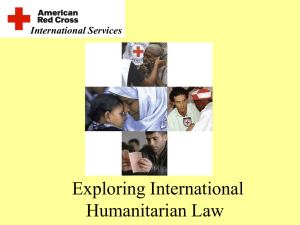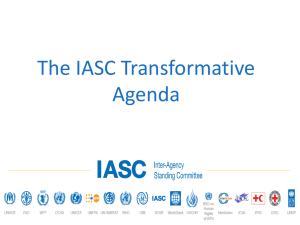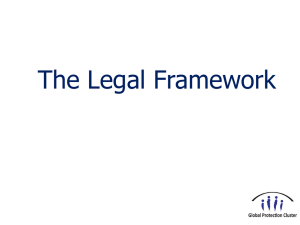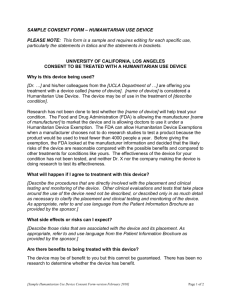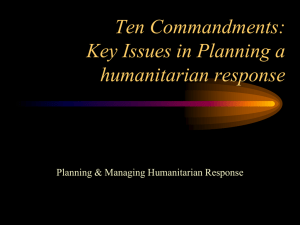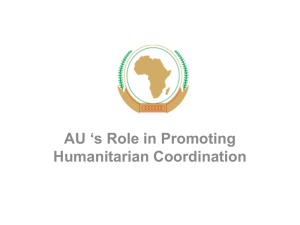POC - concept paper debate 19 August 2013 FINAL EN
advertisement
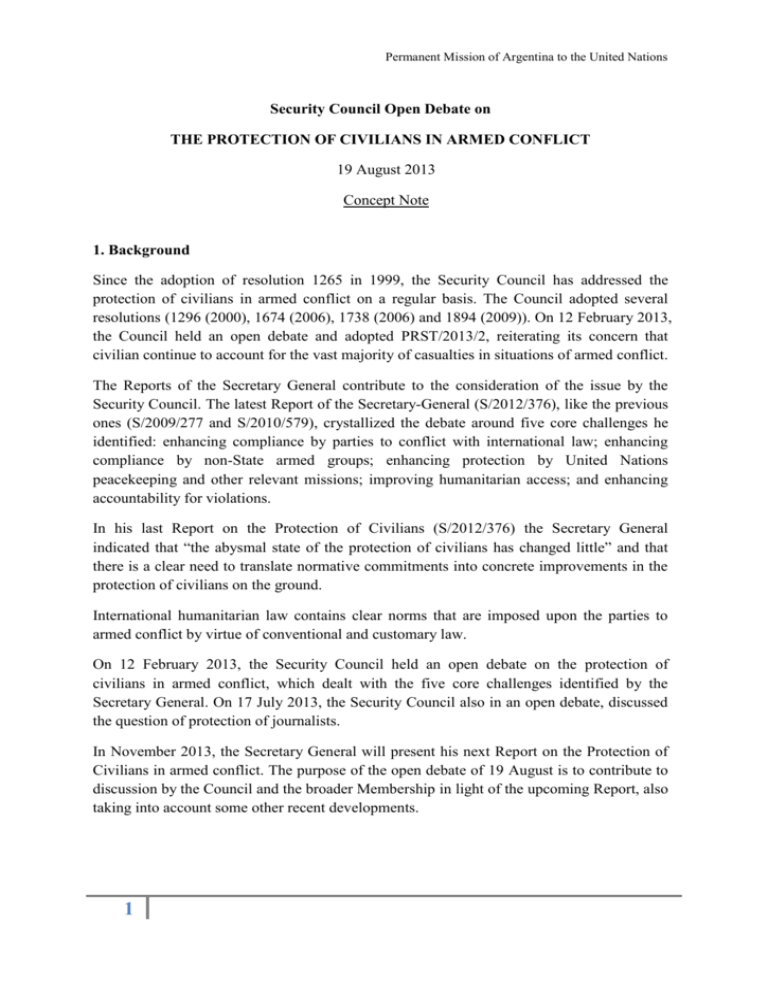
Permanent Mission of Argentina to the United Nations Security Council Open Debate on THE PROTECTION OF CIVILIANS IN ARMED CONFLICT 19 August 2013 Concept Note 1. Background Since the adoption of resolution 1265 in 1999, the Security Council has addressed the protection of civilians in armed conflict on a regular basis. The Council adopted several resolutions (1296 (2000), 1674 (2006), 1738 (2006) and 1894 (2009)). On 12 February 2013, the Council held an open debate and adopted PRST/2013/2, reiterating its concern that civilian continue to account for the vast majority of casualties in situations of armed conflict. The Reports of the Secretary General contribute to the consideration of the issue by the Security Council. The latest Report of the Secretary-General (S/2012/376), like the previous ones (S/2009/277 and S/2010/579), crystallized the debate around five core challenges he identified: enhancing compliance by parties to conflict with international law; enhancing compliance by non-State armed groups; enhancing protection by United Nations peacekeeping and other relevant missions; improving humanitarian access; and enhancing accountability for violations. In his last Report on the Protection of Civilians (S/2012/376) the Secretary General indicated that “the abysmal state of the protection of civilians has changed little” and that there is a clear need to translate normative commitments into concrete improvements in the protection of civilians on the ground. International humanitarian law contains clear norms that are imposed upon the parties to armed conflict by virtue of conventional and customary law. On 12 February 2013, the Security Council held an open debate on the protection of civilians in armed conflict, which dealt with the five core challenges identified by the Secretary General. On 17 July 2013, the Security Council also in an open debate, discussed the question of protection of journalists. In November 2013, the Secretary General will present his next Report on the Protection of Civilians in armed conflict. The purpose of the open debate of 19 August is to contribute to discussion by the Council and the broader Membership in light of the upcoming Report, also taking into account some other recent developments. 1 Permanent Mission of Argentina to the United Nations 2. Areas to be explored It is proposed that delegations address the following specific challenges to strengthen the protection of civilians: 1. Enhancing compliance with IHL, human rights law and refugee law Obligations under international humanitarian law derive from the four 1949 Geneva Conventions –of universal acceptance-, their two 1977 additional Protocols, the 1899 and 1907 Hague Conventions, human rights law and refugee law. In accordance with article 3 common to the four Geneva Conventions, international humanitarian law is applicable also in armed conflicts of a non international character. The Secretary General has indicated that failure to spare the civilian population from the effect of hostilities can result in death, injuries and displacement. Displacement, in turn, puts civilians at risk of other violations, notably sexual violence and forced recruitment. On 23-24 May 2013, Norway, in cooperation with Argentina, Austria, Indonesia and Uganda, hosted the Global Conference on Reclaiming the Protection of Civilians under International Humanitarian Law (“the Oslo Conference”). This Conference concluded a series of regional workshops that took place in Jakarta (2010), Buenos Aires (2011), Kampala (2012) and Vienna (2013), and gathered around 300 participants, including 94 States, with the aim to strengthen the protection of civilians under international humanitarian law. One of the main challenges identified by the Conference is the promotion of compliance with international humanitarian law. The recommendations of the Conference complement those made by the Secretary General in his latest report regarding respect for applicable international law, including IHL, respect for the principles of distinction and proportionality, the need to refrain from displacement of persons as a deliberate tactic and from the use of explosive weapons in densely populated areas. The Conference concluded that States have an obligation not only to respect but also to ensure respect for IHL and should do their utmost to encourage States and other parties to an armed conflict to comply with IHL. The need for increased engagement and dialogue with non-state armed groups to increase respect for IHL among those actors was also identified, and instruments such as unilateral declarations by non-State armed groups, special agreements between governments and non-State armed groups, and so-called “Deeds of Commitment” should be promoted as they have been instrumental. States should refrain from inhibiting humanitarian actors in their efforts to engage non-State armed groups for humanitarian purposes, including undertaking activities aimed at promoting respect for IHL. In addition to full compliance with IHL norms, compliance with relevant UN Security 2 Permanent Mission of Argentina to the United Nations Council resolutions is required. In PRST/2013/2, the Security Council reiterated that States bear the primary responsibility to protect civilians. States are encouraged to use their statements during the debate to outline about steps they are taking to enhance compliance with IHL, human rights law and refugee law within their own and other armed forces as appropriate, as well as by non-State armed groups. 2. Ensuring humanitarian access to affected populations The SG has identified the need to enhance humanitarian access as one of the five core challenges to strengthening the protection of civilians. Access is essential for humanitarian action upon which thousands or even millions of people depend. Constraints to humanitarian access that have the most severe effects on people in need of humanitarian assistance include restrictions to movement of humanitarian workers or goods (including physical and bureaucratic obstacles); absence of agreed mechanisms with the parties to conflict for the delivery of assistance during hostilities; interference in the delivery of humanitarian assistance, including demands of payment; and violence against humanitarian actors, including physical attacks on humanitarian workers and on convoys. In situations of armed conflict, under international humanitarian law the primary responsibility for protecting and meeting the needs of civilians lies with the party under whose control they find themselves. If the party is unable or unwilling to do so, humanitarian agencies can offer their services. Such offers must not be considered as interference in domestic affairs, and consent to relief operations must not be arbitrarily denied. The Oslo Conference recommended that parties to armed conflicts take all necessary measures to ensure rapid and unimpeded access by humanitarian actors. To this end, States and other actors must take active measures to facilitate humanitarian access; States should not place unnecessary bureaucratic burdens on humanitarian actors; States should ensure that counter-terrorism regulations do not unnecessarily hamper and criminalize the activities of humanitarian actors, who must retain the ability to engage with all relevant parties and actors, including non-State armed groups; in the planning and conduct of humanitarian operations, the different needs and vulnerabilities of the affected population should be taken into account, including the gender perspective and the need to develop context-specific protection strategies. Finally, the role that an active humanitarian diplomacy can play is highlighted, in order to facilitate rapid and unimpeded humanitarian access and to ensure respect for, and the protection of, humanitarian personnel and assets, including medical personnel, hospitals and ambulances in all circumstances. States are encouraged to reflect in their statements on the importance of humanitarian access and the practical steps that can be taken to improve access to those in need of protection and 3 Permanent Mission of Argentina to the United Nations assistance. 3. Strengthening accountability for serious violations of IHL and human rights law Accountability is a crucial element for enhancing compliance with international humanitarian law and human rights law, as it contributes to preventing serious violations through spreading the message that they will not be tolerated. The SG’s Report highlighted the role of commissions of enquiry established by the Human Rights Council and made reference to the conclusions of the workshop convened by the Prime Minister of Portugal and OCHA on Accountability and Fact-Finding Mechanisms for violations of IHL and human rights law (see report in document S/2012/373). The Oslo Conference underlined the need for States to cooperate with fact-finding mechanisms for them to be effective. Without prejudice to the varied experience of the UN in this regard, it is worth highlighting that in PRST 2013/2, the Security Council renewed its commitment made in Resolution 1894 (2009) of considering the possibility of recoursing to the International Fact-Finding Commission established by virtue of article 90 of Protocol I additional to the 1949 Geneva Conventions. Combating impunity for serious violations of IHL and human rights law is a commitment of the Security Council made 20 years ago, with the establishment of the International Tribunal for the Former Yugoslavia (ICTY), followed in 1994 by the International Tribunal for Rwanda (ICTR). Last 12 June, the Security Council held a debate on both tribunals and on the role of justice for serious crimes of international concern. The primary responsibility for investigating and prosecuting lies in the State, but when the State is unwilling or unable, international criminal justice mechanisms come into play. With both ad hoc Tribunals established by the Security Council in a phase-out stage, the international criminal justice system is already consolidated with its basis on the International Criminal Court. The role of the ICC, including in situations referred to it by the Security Council, was highlighted in the Oslo Conference, and the workshop organized by Portugal and OCHA made recommendations in that regard, including on certain provisions contained in the two Security Council resolutions making referrals to the ICC 1 (i.e. financing, exemptions to the jurisdiction of the Court, obligation to cooperate with the Court). The Security Council has taken a notable step in its commitment to the fight against impunity through PRST 2013/2, when committing itself to doing a follow up of its decisions regarding international Tribunals (which of course includes referrals to the ICC). This follow-up is essential to ensure cooperation by all Member States of the UN with the ICC. As the SG noted in his 2009 and 2010 reports, reparations is an issue that also needs to be addressed, as victims and communities very often need assistance. As an example, the ICC 1 Resolutions 1593 (2005) and 1970 (2011). 4 Permanent Mission of Argentina to the United Nations has a Trust Fund for Victims. But many times the question of reparations is not taken into account. The Report of the above-mentioned workshop provides the example of the Commission of Enquiry on Darfur. The Commission indicated that “[g]iven the magnitude of damage caused by the armed conflict to civilian populations, it proves necessary to envisage granting reparation to victims of crimes committed during such conflict”2 and recommended the establishment of a Compensation Commission. That recommendation was not followed by the Security Council. States are invited to reflect in their statements on the recommendations arising from the OCHA/Portugal workshop and how these might be implemented, including those relating to reparations. States might also consider the issue of accountability at the national level. States may want to focus their remarks on examples of good practice at the national level in terms of the investigation, prosecution and punishment of persons accused of war crimes and other serious violations of human rights law; and the role of the international community in promoting and supporting national efforts. 3. Format and briefers The Security Council session will feature an Open Debate presided over by Ambassador Susana Ruiz Cerutti, the Legal Adviser to the Ministry of Foreign Affairs and Worship of the Argentine Republic and a Member of the International Humanitarian Fact-Finding Commission (IHFFC). Representatives from the UN Office for the Coordination of Humanitarian Affairs, the Office of UN High Commissioner for Human Rights and from the International Committee of the Red Cross are expected to brief. The meeting will take place on Monday 19 August in the Security Council Chamber and will be open to the participation of non-Security Council members. 4. Outcome No outcome document is expected. * 2 * * Report of the International Commission of Inquiry on Darfur to the United Nations Secretary General Pursuant to Security Council Resolution 1564 of 18 September 2004. Geneva, 25 January 2005, para. 591. 5 Permanent Mission of Argentina to the United Nations 6

